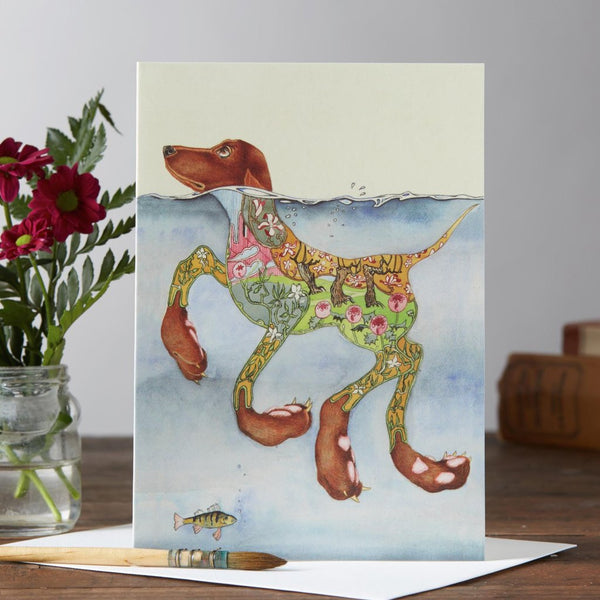A biologist's best friend

Shop the Daniel's Doggy Paddle design
Ship's cats are well documented and many feline friends have had illustrious career's aboard military vessels in particular - none more so than Unsinkable Sam. But dogs can also enjoy a life on the ocean waves.
A 'sea dog' is common slang for an experienced sailor - like this Royal Navy recruit who spent thirteen years out at sea. The phrase may come from the name given to a group of royally-sanctioned English pirates in the 1500s. The sea dogs, including famous names like Sir Walter Raleigh and Francis Drake, were instructed by Queen Elizabeth I to plunder Spanish ships to weaken their navy (and enrich the Crown) when it would have been impossible to win in a fair fight. These underhanded tactics, and a fortuitous storm, enabled the famous defeat of the Spanish Armada in 1588.
Actual canines have also been common aboard ships over the last century at least. The US Navy had dogs aboard its ships not only as a morale booster for stir-crazy sailors, but to help with scouting parties when going ashore in strange lands. Bull dogs were especially popular, with 'Barnacle Bill' being a famous example (I've added a photo of him on Instagram).
Dog's tracking abilities are well employed by humans on land, by scientists have discovered some dogs can also track at sea. In what can seem like a modern fairy tale, the group Conservation Canines, who train dogs to help with scientific endeavours, have put one of their most trusty hounds to work on the waves.
Tucker was an unloved street urchin, hungry and fleabitten. He was taken out of the city pound, aka doggy death row, by the group of conservationists. Tucker became indispensable to his handler, biologist Elizabeth Seely, thanks to his keen nose and unstoppable work ethic. After spell tracking everything from caribou to iganans, the pair began orca hunting out at sea - well, not hunting the orcas themselves exactly.
The biologists were searching for orca excrement, as analysing it can tell them about the food chain and health of the population. The problem being orca poop is merely a smear in the ocean than quickly dissipates. This is where Tucker comes in. Aboard the ship, he can sniff out the breath of a whale and what it has left behind.
Pacing up and down across deck or with the merest twitch of an ear, the dog guides the ship to follow where the whales have been, enabling his owners to scoop up the object of their scientific endeavours. His reward? A favourite doggy chew tied to a sailors rope! Read more about Tucker's work - here and here
Daniel's Doggy Paddle design is available as a greetings card or art print.
